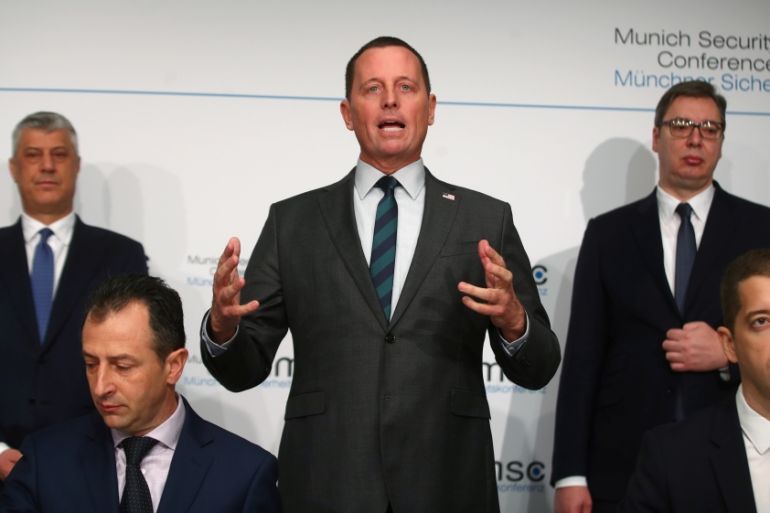‘Another milestone’: Kosovo and Serbia sign rail, road deals
Presidents of Serbia and Kosovo announce US-brokered deal to connect their capitals by rail and road.

The presidents of Serbia and Kosovo have announced deals to work on building rail and road links between their capitals, Belgrade and Pristina.
The deals, brokered by the United States, were signed on Friday during an international security conference in Munich, Germany.
Both countries’ leaders were present at the signing ceremony together with Richard Grenell, US President Donald Trump‘s envoy in the talks.
“I am happy to see progress today and many thanks to President Trump and Richard Grenell on behalf of Serbia, because we feel we will have a better future because of this and that we will ensure peace for future decades,” Serbian President Aleksandar Vucic said.
“Another milestone!” Kosovo President Hashim Thaci said on Twitter. “A great step towards reaching a final peace agreement.”
Grenell told The Associated Press news agency the “historic agreements to develop railway and motorway connections between Belgrade and Pristina will help facilitate the flow of people and goods between Serbia and Kosovo”.
Last month the US envoy also mediated an agreement towards restoring a flight between the two capitals, a link that was dropped during the 1998-99 war in which Kosovo, a former Serbian province, broke away from Belgrade.
|
|
While the deals are mostly symbolic at this stage, the signing ceremony on Friday marked a rare moment of cooperation between two leaders who have refused return to the negotiation table for more than a year.
Serbia does not accept Kosovo’s 2008 declaration of independence, although its former province has been recognized by about 100 countries, including the US and most European Union nations.
In Pristine, Albin Kurti, Kosovo’s new prime minister, complained that the signatory officials were from the old Cabinet and not authorised by the new one.
A statement from his office complained of the lack of transparency of the deal, saying that “it is very important that the process be transparent, the result of pure negotiations and in full respect of the country’s laws and sovereignty”.
Kurti of the left-wing Self-Determination Movement, or Vetevendosje!, came to power earlier this month following lengthy talks on a governing coalition, pledging to fight crime and corruption.
Resuming dialogue with Serbia over normalising ties, stalled since the previous government set a 100 percent tariff on Serb goods, remains a top challenge.
EU-led talks between Belgrade and Pristine broke down after Kosovo’s tariff move in late 2018.
When it comes to transport, there is currently a train linking a small city in central Serbia to a northern Kosovo town, but no complete Belgrade-Pristina passenger line.
Most people travel by car and bus over small and poorly maintained roads that cross the border.